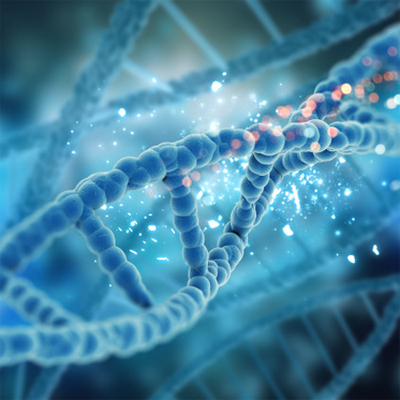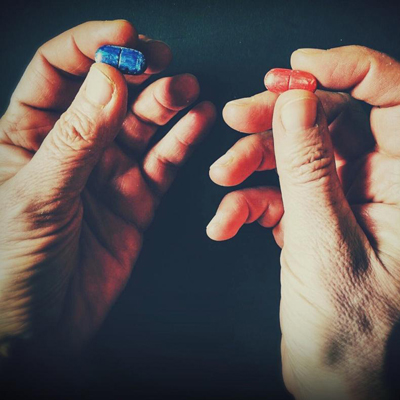Can we transform our genes and DNA with our thoughts?
Multiple studies have indicated the likelihood that under the right methods and conditions one can impact their genes and DNA with thought or intention.

For the first time, researchers have been able to construct a gene network that can be controlled by thoughts. Martin Fussenegger, a professor at ETH Zurich led the research project that shows the powerful potential of thought. While we can’t answer the question for certain quite yet that we could control our genes and DNA with thought, discovery seems to be moving in that direction.
This may turn the heads of some scientific consciences as it was always believed that we are a victim of our genes in a sense, and that we have no conscious control over how our body functions. But epigenetics is starting to paint a different picture over time. The field of epigenetics refers to the science that studies how the development, functioning and evolution of biological systems are influenced by forces operating outside the DNA sequence, including intracellular, environmental and energetic influences.
According to cellular biologist Dr. Bruce Lipton, the new biology moves you out of victim-hood and into Mastery – mastery over your own health. He is referring to using thought and emotion to alter genes. “We have to come to a new way of understanding biology. This ‘new’ understanding has actually already been in the leading edge of science for 10 years now. It takes at least 10 or 15 years for science to take a fact from its first inception and get it out into the public so that the people can understand it. That means anything in current textbooks is at least 10 or 15 years old. What your going to hear is whats going to be the future textbooks.” – Dr. Bruce Lipton.
Tapping into human brainwaves
Marc Folcher and other researchers from the group led by Martin Fussenegger, Professor of Biotechnology and Bioengineering at the Department of Biosystems (D-BSSE) in Basel, were able to tap into brainwaves and convert genes into proteins (gene expression) using a new gene regulation method. “For the first time, we have been able to tap into human brainwaves, transfer them wirelessly to a gene network and regulate the expression of a gene depending on the type of thought. Being able to control gene expression via the power of thought is a dream that we’ve been chasing for over a decade,” Martin Fussenegger.
The system was presented in the scientific journal Nature Communications. The system records brainwaves and wirelessly transmits them to an implant which uses an LED lamp that produces near infrared light. The culture chamber containing genetically modified cells is illuminated which in turn tells them to start producing the desired proteins.
As stated by ETH Zurich: “To regulate the quantity of released protein, the test subjects were categorised according to three states of conscience: bio-feedback, meditation and concentration. Test subjects who played Minecraft on the computer, i.e. who were concentrating, induced average SEAP values in the bloodstream of the mice. When completely relaxed (meditation), the researchers recorded very high SEAP values in the test animals. For bio-feedback, the test subjects observed the LED light of the implant in the body of the mouse and were able to consciously switch the LED light on or off via the visual feedback. This in turn was reflected by the varying amounts of SEAP in the bloodstream of the mice.”
The source for inspiration in this new gene network came from a game called Mindflex, where players would wear a special headset and through a sensor on their forehead would use thought to influence a small ball through an obstacle course. The registered electroencephalogram (EEG) was transferred from the person’s mind through the measuring system and into the game.
The idea that our thoughts and brainwaves can have so much power seems like something we would find in some futuristic fiction novel or movie. But the reality of such an idea has been talked about for centuries and many great thinkers believed that everything in our world is connected and therefore could impact one another. Albert Einstein, Leonardo Da Vinci and Nikola Tesla are known for discussing those ideas.
Further examples

A 2002 article published in the American Psychological Association’s journal Prevention & Treatment, by University of Connecticut psychology professor Irving Kirsch titled, “The Emperor’s New Drugs,” made some more shocking discoveries. He found that 80 percent of the effect of antidepressants, as measured in clinical trials, could be attributed to the placebo effect. This professor even had to file a Freedom of Information Act (FOIA) request to get information on the clinical trials of the top antidepressants.
A Baylor School of Medicine study, published in 2002 in the New England Journal of Medicine, looked at surgery for patients with severe and debilitating knee pain. Many surgeons know there is no placebo effect in surgery, or so most of them believe. The patients were divided into three groups. The surgeons shaved the damaged cartilage in the knee of one group. For the second group, they flushed out the knee joint, removing all of the material believed to be causing inflammation. Both of these processes are the standard surgeries people go through who have severe arthritic knees. The third group received a “fake” surgery, the patients were only sedated and tricked that they actually had the knee surgery. For the patients not really receiving the surgery, the doctors made the incisions and splashed salt water on the knee as they would in normal surgery. They then sewed up the incisions like the real thing and the process was complete. All three groups went through the same rehab process, and the results were astonishing. The placebo group improved just as much as the other two groups who had surgery. “My skill as a surgeon had no benefit on these patients. The entire benefit of surgery for osteoarthritis of the knee was the placebo effect” – Dr. Moseley (Surgeon involved in the study).
Working beyond the denial of new science
With any new great discoveries or far-reaching ideas, there will be those who rigidly stick to the current sphere of thinking and who talk down to the dreamers and great thinkers of our world who are trying to push the boundaries. Ideas of consciousness having an impact on our reality in some way has been labelled as “woo-woo” or wishful thinking by many, even though research suggests the possibility. Why not explore the fascinating possibility that this can be possible instead of casting it aside?
Perhaps we are at an important juncture in time when it comes to the science of consciousness. Year after year more great scientists are joining the field of study and producing some fascinating work. The body of evidence continues to grow but so does the skepticism and hatred towards the field. Perhaps because it challenges the rigid, close-conscience culture of much of the scientific community? Or maybe there simply isn’t enough research yet for people’s worldviews to shift?
Either way, it’s clear one of the most important things we can do at this stage of the game is to stay open and not allow our beliefs to interrupt the search for truth. Sensemaking is an important aspect of our lives at the moment, and learning to truly explore information is key. One basic step to this is taking a step back from information consumption and reconnecting with self.
“A fundamental conclusion of the new physics also acknowledges that the observer creates the reality. As observers, we are personally involved with the creation of our own reality. Physicists are being forced to admit that the universe is a “conscious” construction. Pioneering physicist Sir James Jeans wrote: “The stream of knowledge is heading toward a non-mechanical reality; the universe begins to look more like a great thought than like a great machine. Conscience no longer appears to be an accidental intruder into the realm of matter, we ought rather hail it as the creator and governor of the realm of matter. Get over it, and accept the inarguable conclusion. The universe is immaterial-conscious and spiritual.” – R.C. Henry, Professor of Physics and Astronomy at Johns Hopkins University, “The Conscient Universe”; Nature 436:29,2005.
Dive deeper
These days, it’s not just knowing information and facts that will create change, it’s transforming ourselves, how we go about communicating, and re-assessing the underlying stories, ideas and beliefs that form our world. We have to practice these things if we truly want to transform.
yogaesoteric
February 9, 2021
Also available in:
 Français
Français
